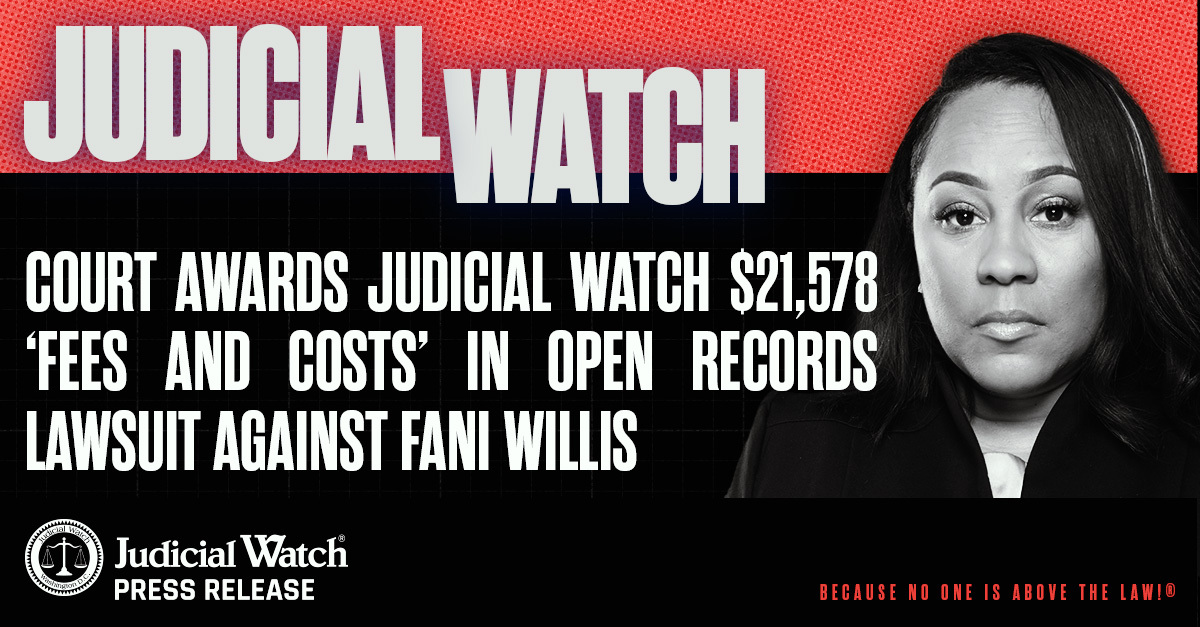

Judicial Watch: Judge Wants Explanation from State Department on ‘Newly’ Discovered Clinton Records
(Washington, DC) – Judicial Watch announced today that a federal judge ordered the State Department to explain how and when new records from the office of Hillary Clinton were located and why they were not identified previously. The court order comes in a Freedom of Information Act (FOIA) lawsuit seeking records about the State Department vetting of then-Secretary of State Hillary Clinton’s potential conflicts of interest. The explanation was initially due on Monday, but Judge Rudolph Contreras granted the State Department an extension to Friday, February 5, 2015, due to the federal government shutdown because of the recent blizzard (Judicial Watch v. U.S. Department of State (No. 1:15-cv-00688)).
Last month, Judicial Watch learned that the Obama State Department recently found “thousands” of new records from Hillary Clinton’s tenure as Secretary of State. According to information provided to Judicial Watch by various Justice Department attorneys, the new documents appear be “working” records in electronic format located on both “shared” and “individual” drives accessible to or used by persons identified as being relevant to Judicial Watch’s Freedom of Information Act (FOIA) lawsuits on the Benghazi scandal and controversies from Clinton’s term at State. The State Department admitted to Judge Contreras on January 14 that the new records include the files of two of Clinton’s top aides:
The newly identified files that need to be searched in this case consist of office files that were available to employees within the Office of the Secretary during former Secretary Clinton’s tenure as well as individual files belonging to Jake Sullivan and Cheryl Mills.
Judge Contreras responded with a January 15 order that states:
Defendant [State Department] shall complete its additional search and file a status report (1) disclosing the volume of potentially responsive documents that must be reviewed, (2) containing a detailed description of how and when these files were located and why they had not been previously identified, and (3) proposing a revised schedule for the production of the non-exempt portions of responsive documents subject to the Freedom of Information Act.
At a July 9, 2015, hearing the judge was “concerned” about the preservation of Clinton’s records and warned that the State Department will “have to answer for” any destruction of Hillary Clinton email records.
The lawsuit stems from a Judicial Watch FOIA request on March 17, 2015, and a subsequent lawsuit filed on May 6, 2015, seeking:
- Records that identify the policies and/or procedures in place to ensure that former Secretary of State Hillary Rodham Clinton’s personal or charitable financial relationships with foreign leaders, foreign governments, and business entities posed no conflict of interest to her role as Secretary of State; and
- Records concerning the State Department’s review of donations to the Clinton Foundation for potential conflicts of interest with former Secretary Clinton’s role as Secretary of State.
“The State Department is protecting Hillary Clinton and has a history of illegally hiding documents from the courts and the public about her record,” said President Tom Fitton. “These newly found Hillary Clinton records show the State Department needs special policing from the courts, federal investigators, and Congress.”
A separate and ongoing Judicial Watch lawsuit, one of nearly 23 active Judicial Watch lawsuits at which the Clinton email system is at issue, forced the disclosure last year of documents that provided a road map for over 200 conflict-of-interest rulings that led to $48 million for the Clinton Foundation and other Clinton-connected entities during Hillary Clinton’s tenure as secretary of state. Previously disclosed documents in this lawsuit, for example, raise questions about funds Clinton accepted from entities linked to Saudi Arabia, China and Iran, among others.
###















